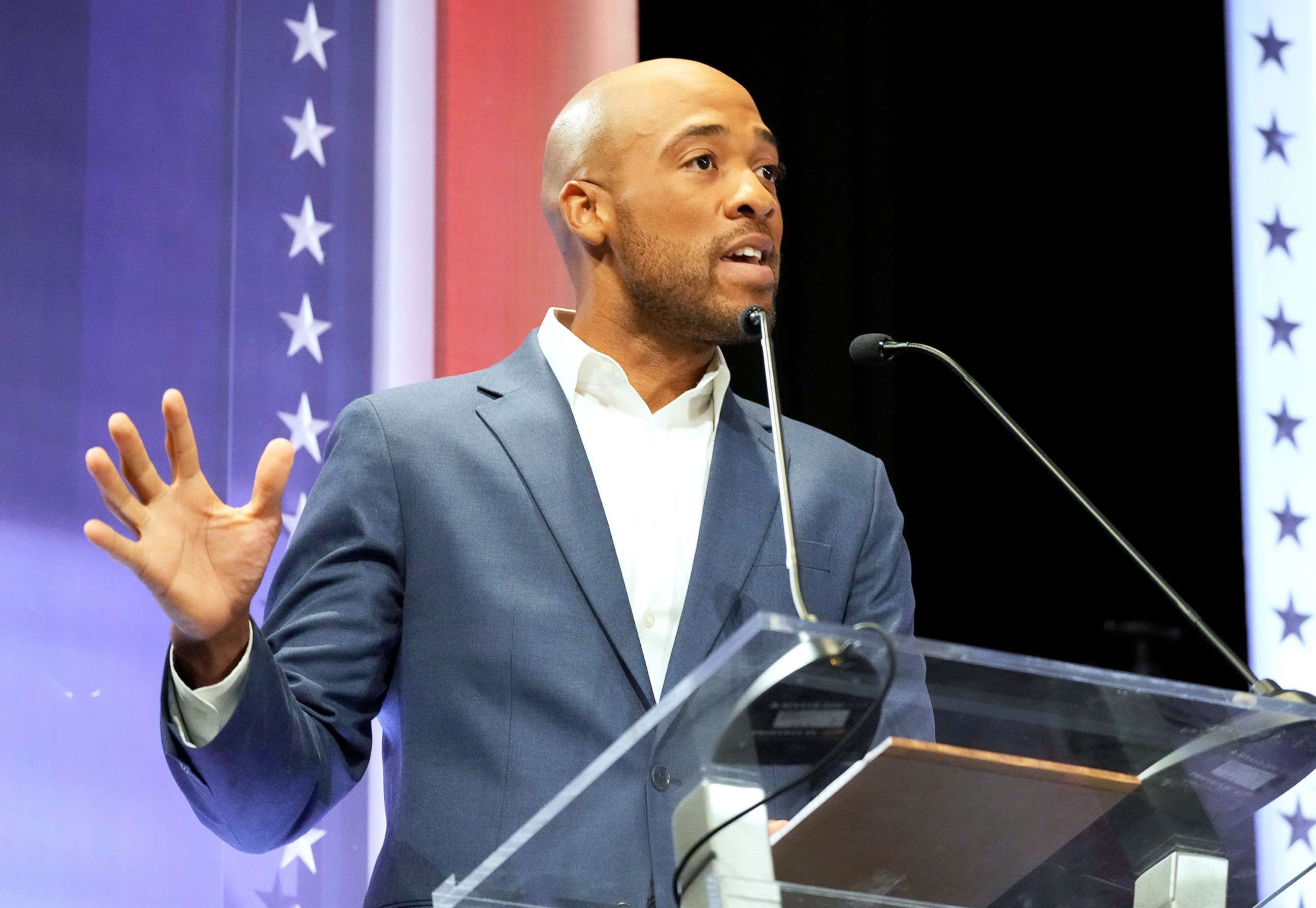Ilhan Omar squeaks to victory -- and other Tuesday night primary surprises: Analysis
Here's a closer look at the results in four states and what they mean.
Primary voting in Connecticut, Minnesota, Vermont and Wisconsin on Tuesday brought both a nail-bitingly close call for one of the country's most prominent -- or polarizing, depending on the view -- progressives in the House and opened the door to deliver several historic firsts to Washington.
In Minnesota's 5th District, Rep. Ilhan Omar eked out a win over challenger Don Samuels by some 2% while in Vermont and Wisconsin, state Sen. Becca Balint and Lt. Gov. Mandela Barnes, respectively, won their Democratic nominations to seek House and gubernatorial seats. Barnes sailed to victory with some 78% after his major challengers all dropped out in recent days, coalescing around him as the best chance to unseat Republican incumbent Sen. Ron Johnson.
Meanwhile a special election for Minnesota's 1st District was another in the small but growing examples of Democratic strength despite major political challenges, like President Joe Biden's low approval ratings and high inflation: In the special election for a historically red seat, Republican Brad Finstad won out over Democrat Jeff Ettinger by only 4%.
Maggiy Emery, a spokeswoman for Ettinger, told ABC News the enthusiasm for him was in part because of abortion rights in the wake of Roe v. Wade's overturning: "We heard about abortion on the doors, at events and digitally from in-district voters. Not as much as inflation, but it's certainly top of mind for many voters, especially women, in the district."
Also in Wisconsin, Republican state Assembly Speaker Robin Vos beat out a Donald Trump-supported challenger, Adam Steen, in the continued fallout of Trump targeting those he perceives as insufficiently loyal to his 2020 election lies.
Here's a closer look at Tuesday's surprises and what they mean.
A MAGA wave in Wisconsin
And as is common in Republican primaries, voters are continuing to grow the impact of right-wing MAGA candidates inside their own party -- even with Trump not up for election.
Down-ballot in Wisconsin, several crests kept building toward an internal red wave. In the GOP contest for governor, Trump-backed Tim Michels bested former Vice President Mike Pence's pick, Lt. Gov. Rebecca Kleefisch.
But even in the proxy battle between the former president and his estranged erstwhile running mate, there's little daylight between their preferred candidates when it comes to baselessly questioning the legitimacy of the 2020 election -- a position that Michels' future challenger, Democratic incumbent Gov. Tony Evers, was quick to highlight Tuesday.
“As governor, my No. 1 priority is to take care of the hardworking people of Wisconsin,” Michels, whom Trump has called an "incredible success story," said in his victory speech.

Denying Biden's presidential win isn't just a requirement for Trump's stamp of approval -- the issue has become essential to capturing a notable slice of the Republican electorate, no matter what outside endorsements a candidate wishes to curry.
The reverse carries a big risk: On Tuesday night, Washington Rep. Jamie Herrera Beutler conceded her race -- another of the 10 House Republicans who voted for Trump's impeachment last year to lose their seat. (Only two, California's David Valadao and Washington's Dan Newhouse, have hung on so far.)
Wisconsin voters also handedly delivered a win to Sen. Johnson, one of 10 Republicans in the upper chamber who pushed for an audit of the last presidential election.
Democrats believe Johnson's strong ties to the GOP base may make him vulnerable in November in one of the country's most divided battlegrounds.
Democrats hope to defy political headwinds
While many of Tuesday's Republican wins were expected, the real excitement was in Democratic races. That includes the primary victory for Barnes, who, if elected in the fall, would be the first Black senator from the state and would join the ranks of the very few Black senators in Congress.
State Sen. Balint's win in the Democratic primary for Vermont's at-large House seat also made headlines as she becomes her state's presumptive next representative -- and the first woman Vermont has sent to Congress, ever. She'd also be the first openly gay House member from Vermont.
And one more unusual result in Vermont: Perennial Republican candidate H. Brooke Paige won -- all at once -- his party's nominations to be the state's attorney general, secretary of state, auditor and treasurer. That means Paige now gets the distinct pleasure of choosing which nomination to accept and run for in the general election.

Omar's near-loss breaks her winning streak
Elsewhere, progressives may be looking nervously at the narrow win of "squad" member Rep. Omar. One of the most visible members of the Democrat's leftist flank, she squeaked by against more centrist challenger Samuels, a former Minneapolis City Council member who had split with her over issues of police reform and public safety.
Some may interpret Omar's slim 2,500-vote win as a warning sign for progressives, but it's important to remember some of the contributing factors in the race. In the closing weeks of the primary, Samuels' supporters Super PAC Make A Difference MN05 spent more than $400,000 to boost him.
Omar declined to debate Samuels and opted not to run any TV ads, perhaps an indication her campaign believed she'd replicate her double-digit primary wins in 2018 and 2020.
During his concession on Tuesday night, Samuels said he felt his narrow defeat sent a message of what sort of candidate was electable.
"The fact that we could be two-and-a-half points behind an incumbent in the United States Congress says that if the playing field were even -- if it were not an incumbent-challenger situation -- we would win this race," Samuels told a crowd of supporters.
"To come this close means that we have our finger on the pulse of the exhausted majority," he said.
And to Omar, he offered a warning: "My only hope is that my opponent will have learned a lesson from this. You cannot give poor constituent service -- put your own dreams above the dreams and visions and desires of their community."

In her post-win statement, Omar did not directly address Samuel, instead saying her victory was a "testament" to how much her constituents share her values: "the collective values we are fighting for and how much they're willing to do to help us overcome defeat."
"This win is for them and everyone who still believes that hate, division and regression will not be the legacy of the Fifth," she said.
When asked by ABC News about Samuels' comments, Omar spokesperson Jeremy Slevin referred back to her Tuesday night statement.
ABC News' Will McDuffie contributed to this report.




